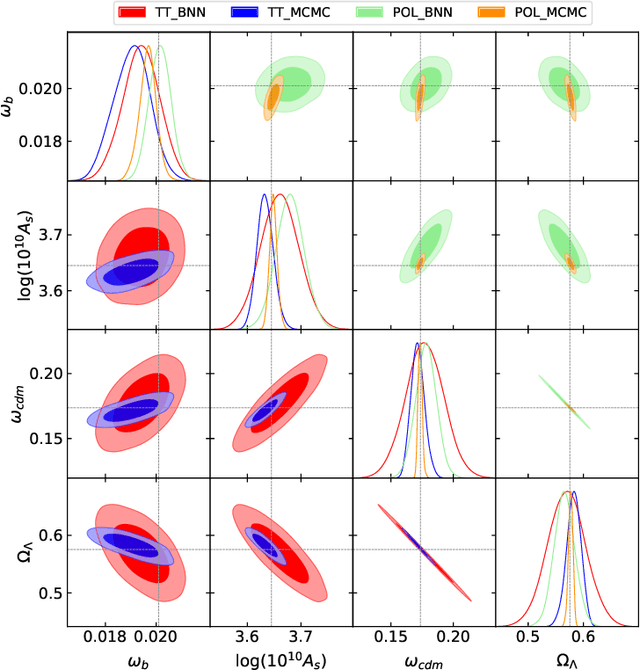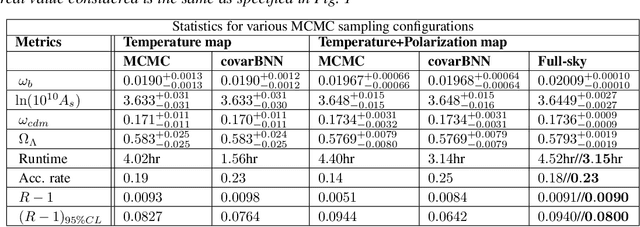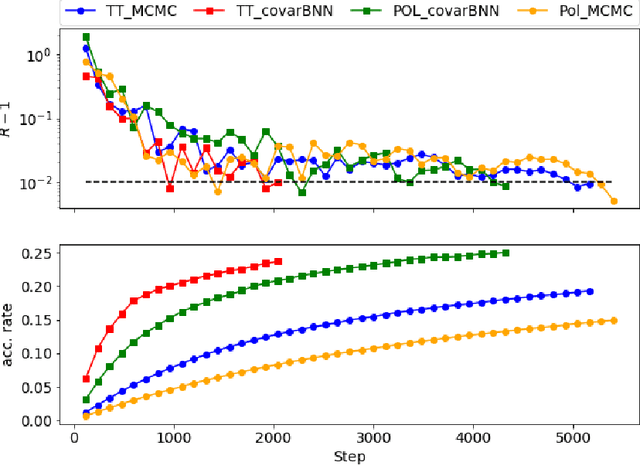Luigi Malago
Accelerating MCMC algorithms through Bayesian Deep Networks
Nov 29, 2020


Abstract:Markov Chain Monte Carlo (MCMC) algorithms are commonly used for their versatility in sampling from complicated probability distributions. However, as the dimension of the distribution gets larger, the computational costs for a satisfactory exploration of the sampling space become challenging. Adaptive MCMC methods employing a choice of proposal distribution can address this issue speeding up the convergence. In this paper we show an alternative way of performing adaptive MCMC, by using the outcome of Bayesian Neural Networks as the initial proposal for the Markov Chain. This combined approach increases the acceptance rate in the Metropolis-Hasting algorithm and accelerate the convergence of the MCMC while reaching the same final accuracy. Finally, we demonstrate the main advantages of this approach by constraining the cosmological parameters directly from Cosmic Microwave Background maps.
Reliable Uncertainties for Bayesian Neural Networks using Alpha-divergences
Aug 15, 2020Abstract:Bayesian Neural Networks (BNNs) often result uncalibrated after training, usually tending towards overconfidence. Devising effective calibration methods with low impact in terms of computational complexity is thus of central interest. In this paper we present calibration methods for BNNs based on the alpha divergences from Information Geometry. We compare the use of alpha divergence in training and in calibration, and we show how the use in calibration provides better calibrated uncertainty estimates for specific choices of alpha and is more efficient especially for complex network architectures. We empirically demonstrate the advantages of alpha calibration in regression problems involving parameter estimation and inferred correlations between output uncertainties.
Constraining the Reionization History using Bayesian Normalizing Flows
May 14, 2020



Abstract:The next generation 21 cm surveys open a new window onto the early stages of cosmic structure formation and provide new insights about the Epoch of Reionization (EoR). However, the non-Gaussian nature of the 21 cm signal along with the huge amount of data generated from these surveys will require more advanced techniques capable to efficiently extract the necessary information to constrain the Reionization History of the Universe. In this paper we present the use of Bayesian Neural Networks (BNNs) to predict the posterior distribution for four astrophysical and cosmological parameters. Besides achieving state-of-the-art prediction performances, the proposed methods provide accurate estimation of parameters uncertainties and infer correlations among them. Additionally, we demonstrate the advantages of Normalizing Flows (NF) combined with BNNs, being able to model more complex output distributions and thus capture key information as non-Gaussianities in the parameter conditional density distribution for astrophysical and cosmological dataset. Finally, we propose novel calibration methods employing Normalizing Flows after training, to produce reliable predictions, and we demonstrate the advantages of this approach both in terms of computational cost and prediction performances.
 Add to Chrome
Add to Chrome Add to Firefox
Add to Firefox Add to Edge
Add to Edge